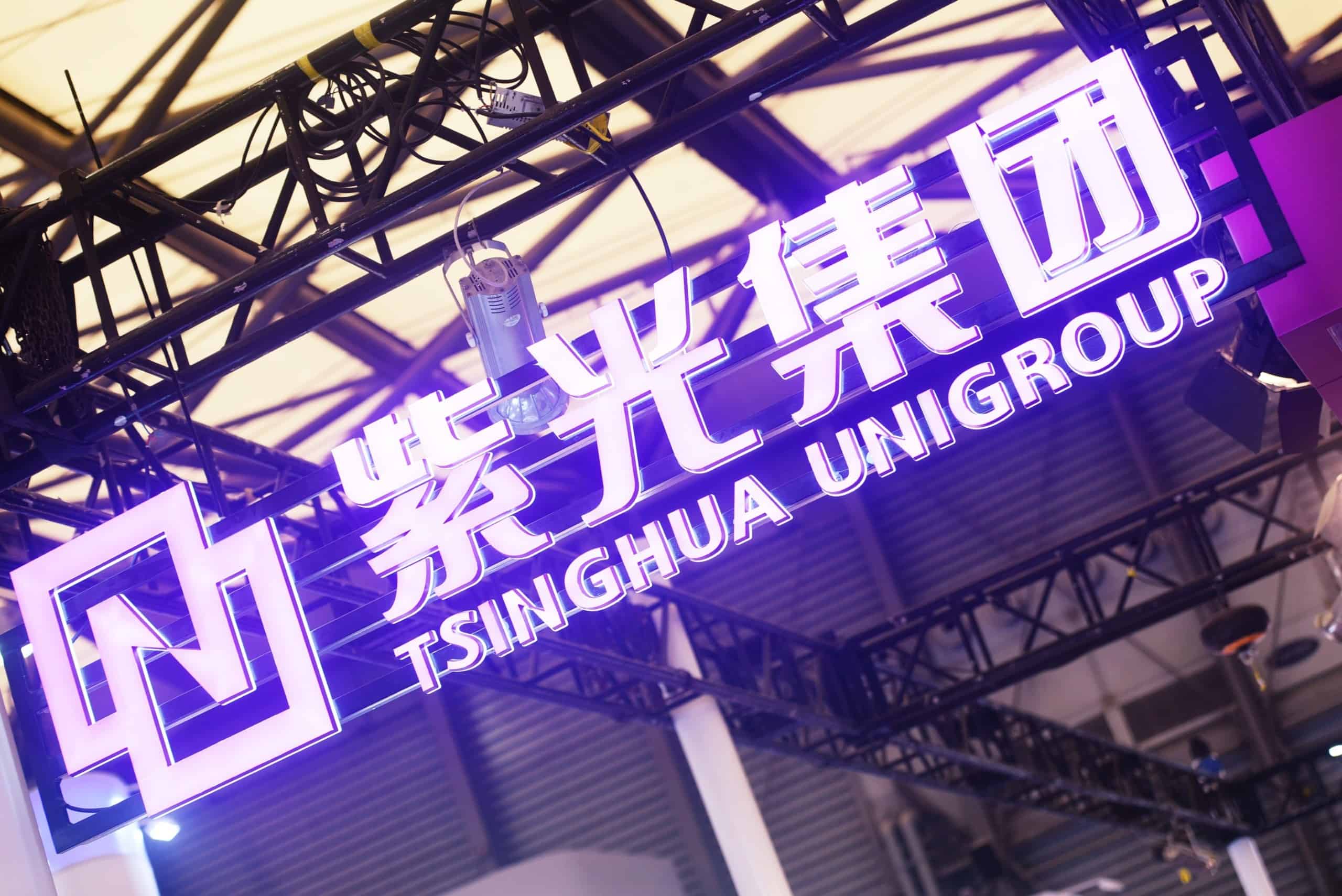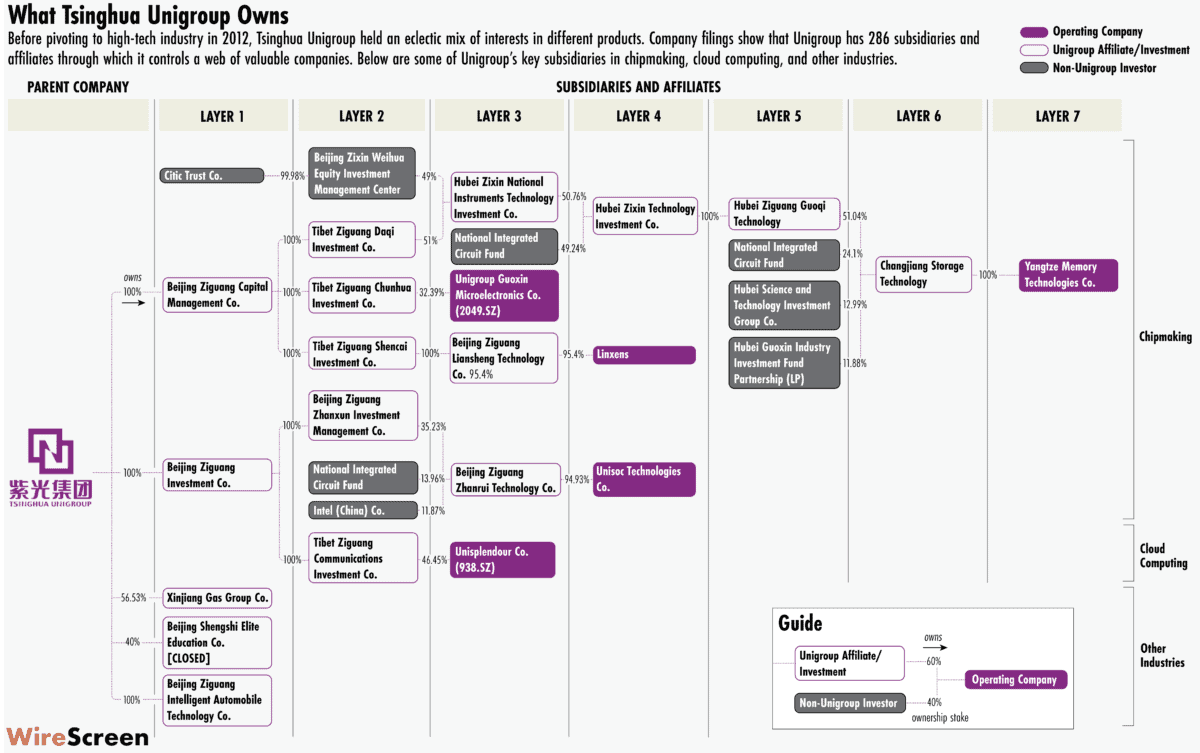
One of China’s most prominent homegrown chipmakers is up for sale. Media reports suggest tech giant Alibaba is the frontrunner to take over Tsinghua Unigroup, the debt-saddled semiconductor manufacturer that’s currently majority-owned by Tsinghua University, in a deal worth nearly $8 billion.
Buying Unigroup would be a significant win for Alibaba, which is reeling from a political crackdown over the past year. It would also provide a lifeline for a company once at the forefront of China’s national push to build a homegrown semiconductor industry.
How Unigroup landed in this position, despite backing from one of China’s most prestigious universities in an environment flush with subsidies, is a complicated question. This week, The Wire charts its rapid debt-fueled expansion, its many investments, and what a deal could mean for its future.
HERBAL ROOTS

Unigroup’s origins in 1988 had little to do with chipmaking. Although affiliated with Tsinghua University, China’s premier school for science and engineering, Unigroup at first peddled an eclectic mix of products, including herbal medicines, natural gas, and computer scanners.
That changed when Zhao Weiguo bought into Unigroup via his firm, Beijing Jiankun Group, amassing a 49 percent stake in the company by 2010. Zhao, a Tsinghua alum who made his fortune in real estate and mining, reoriented Unigroup towards chips and high-tech enterprise in 2012.
The pivot was well timed. In 2014, China’s State Council set the goal of making China a global leader in semiconductor manufacturing by 2030 and established a $23 billion National Integrated Circuit Fund to promote “mergers and regroupings,” particularly with chipmakers overseas. Unigroup was a major beneficiary, and has enjoyed additional subsidies from local governments eager to attract chipmaking businesses to their cities.
INVESTMENTS

Zhao embarked on an acquisition spree, spending $2.7 billion in 2013 to take private Spreadtrum Communications and RDA Microelectronics, two U.S.-listed Chinese chipmakers, before merging them to form Unisoc, now one of China’s largest mobile phone chip makers. Unigroup also signed partnerships with major Western tech companies, including Intel and HP, taking stakes in HP’s Chinese server and storage business H3C, as well as Western Digital.
Yet Unigroup’s botched attempt in 2015 to acquire U.S. memory chip producer Micron Technology for $23 billion grabbed headlines for the wrong reasons. The deal would have been the largest ever Chinese takeover of an American brand by far. But Micron executives rejected the plan, amid doubts over whether Cfius — which reviews inward investment in the U.S. for national security concerns — would approve such a deal.
Undeterred, Unigroup continued with its overseas acquisitions. Its sprawling structure now includes 286 subsidiaries, according to company filings. Standout businesses include Unisplendour Co., the firm’s profitable cloud computing arm, and Guoxin Microelectronics, Unigroup’s only publicly-traded chipmaking unit, which makes security chips for smartphones.
For all the acquisitions abroad, homegrown subsidiary Yangtze Memory Technology Corp (YMTC) remains the jewel in the company’s portfolio. Founded in Wuhan in 2016, YMTC makes flash memory devices: a high-performance storage chip found in USB sticks, solid-state hard drives, and smartphones. Last year, it announced a breakthrough in developing a new type of memory chip that narrows the gap between it and leaders like Samsung and Micron.
Still, it’s unlikely that YMTC’s will be displacing those leaders anytime soon, according to Douglas Fuller, an associate professor at City University of Hong Kong who specializes in innovation and technology policy. Talent shortages and growing difficulties acquiring foreign-made specialist machines necessary to build the most advanced chips are hurdles that Chinese firms are unlikely to overcome soon.
Unigroup did not respond to a request for comment.

REBOOTING…
On top of its high-tech subsidiaries, Unigroup also acquired stakes in an eclectic collection of firms, from a Xinjiang natural gas supplier, to an ed-tech company, and a casualty insurance business.
Heightened overseas scrutiny of foreign investments in the chipmaking sector and tightening Chinese restrictions on capital outflows have both dealt blows to Unigroup’s overseas acquisition strategy since 2016. Even greater damage came when majority shareholder Tsinghua University was forced to overhaul its business divisions in 2018, thanks to Beijing’s campaign to reduce the corporate assets of public universities.
Tsinghua Unigroup’s empire-building had left it with a debt pile of about $31 billion by June 2020, with a quarter of it coming due by the middle of this year. It first defaulted on a domestically issued bond in November 2020, and began a restructuring in September. A deal with Alibaba, which has a strong cloud computing business and is developing its own chips, could provide both the know-how and capital to resurrect Unigroup.
“The fact that [Alibaba has] those chip chopping skills and they have cash flow…maybe this is Jack Ma’s political redemption, too,” says Willy Shih, a professor of technology and operations management at Harvard Business School. “So I think it’s a pretty attractive move.”
But City University’s Fuller is more skeptical that Unigroup’s tech will provide much value to Alibaba in the longer term. “YMTC is the only really viable flash memory producer in China. So if your goal is to buy a flash memory producer, that’s the one you should buy,” says Fuller. “Alibaba is a big cloud provider, so they need lots of flash memory. But are there real synergies there, even over the next five years? I would say probably not.”
“But this is really a political decision more than an investment decision. You’re probably overpaying, but that’s not the point.”

Eliot Chen is a Toronto-based staff writer at The Wire. Previously, he was a researcher at the Center for Strategic and International Studies’ Human Rights Initiative and MacroPolo. @eliotcxchen



